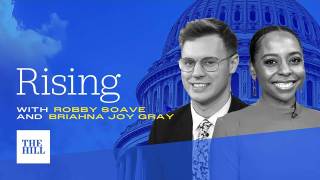Why political rivals can and should come together for press freedom
A broad coalition of Republicans and Democrats uniting in an election year to protect press freedom? It sounds unlikely — even absurd. America’s partisan divides are deeper than ever, and trust in the media is at an all time low.
And yet this rare show of bipartisanship is exactly what’s happening in Washington, D.C. Last month, the House passed the Protect Reporters from Exploitive State Spying (PRESS) Act by unanimous consent. It’s the strongest “shield” bill to protect journalists and their sources ever introduced in Congress.
The PRESS Act would bar the government from surveilling journalists or their technology providers except in highly unlikely Hollywood scenarios, like where preventing a terrorist attack or murder depends on the content of a journalist’s inbox. It would also restrict prosecutors and litigants from seeking judicial orders forcing journalists to burn their sources.
The PRESS Act also claims bipartisan support in the Senate, with sponsors including Democratic Sens. Dick Durbin (Ill.) and Ron Wyden (Ore.) and Republican Sens. Lindsey Graham (S.C.) and Mike Lee (Utah). It’s not the first time a “shield” bill for reporters has enjoyed bipartisan support — Graham previously sponsored one with now-Majority Leader Chuck Schumer (D-Ill.). Other supporters of shield legislation include former Vice President Mike Pence and House Judiciary Chairman Jim Jordan.
So why the political truce? It’s likely because lawmakers see the PRESS Act as a nonpartisan solution to a nonpartisan problem. Administrations from both parties have abused their power to retaliate against journalists who have criticized them or exposed their secrets.
Before Trump’s administration seized journalists’ phone records, Obama’s administration secretly read then-Fox News journalist James Rosen’s emails. Before Trump added despicable remarks about jailing journalists to his stump speeches, Obama officials called Rosen a criminal “co-conspirator” for his reporting. Both the Obama and George W. Bush administrations threatened then-New York Times reporter James Risen with jail when he refused to out sources.
The Biden administration, at one time, deserved credit for enacting policies against seizing journalists’ materials except when the journalist is suspected of a crime. But it’s since launched investigations that threaten to make routine newsgathering a crime in and of itself — and ignored demands for transparency from dozens of press freedom and civil liberties groups.
While cases that impact presidential politics tend to get the most attention, subpoenas for news sources often target entirely non-political journalism, from crime reporting in Houston to stories about athletes using steroids to investigations exposing sex crimes by celebrities.
Right now, CBS journalist Catherine Herridge is risking being held in contempt of court for refusing to divulge her sources for her reporting, back when she was with Fox News, on a federal investigation of a scientist who operated a graduate program in Virginia. The judge in the case has specifically cited the absence of a federal shield bill in response to Fox’s efforts to contest the scientist’s subpoena.
People might not like some media outlets, or even most media outlets, but we all depend on some form of media. And those dissatisfied with the media landscape should be pleased that the PRESS Act defines journalism broadly (and apolitically), so that upstarts and alternative outlets that can’t afford lawyers to fend off subpoenas will enjoy the same protection as the Wall Street Journal and New York Times.
Forty-nine states recognize a reporter’s privilege, leaving the federal government as an outlier. The U.S. is also an outlier internationally. The world’s strongest democracies have legislation on the books to protect journalists from government snooping. Canada’s press shield law, enacted in 2017, has demonstrably protected journalistic sources. In Sweden, the first country to codify press freedom into its constitution in 1766, the confidentiality standard between reporter and source is strong enough to resemble attorney client privilege.
The U.S.’s failure to live up to its own First Amendment’s values undermines its credibility as a supposed global leader on press freedom. In fact, the lack of a federal press shield law is explicitly cited as one reason the U.S. is currently 45th on Reporters Without Borders’ World Press Freedom Index.
The PRESS Act is written to protect journalists and their sources, but the ultimate beneficiary is the American public. When journalists can’t protect their sources, it’s the public’s right to know that suffers most.
Sources, including public employees, don’t bring evidence of malfeasance to journalists if they think the government is going to discover their identities through surveillance. They don’t trust journalists’ promises of confidentiality if they believe a federal judge might force the journalist to choose between burning sources and going to jail.
To be clear, journalists aren’t above the law. But our legal system treats plenty of other confidential communications as privileged, including communications between therapists and patients, lawyers and clients — even married couples. Surely, psychologists’ testimony could be helpful to prosecutors, but the law recognizes that any upside is not worth discouraging people in need from seeking treatment.
The same goes here. Journalists don’t work for the government, and the government should not be able to commandeer the Fourth Estate, scare off journalists’ sources, and deprive the public of important news just because it’s sometimes convenient.
Last year, despite widespread support, a single anti-press senator, Tom Cotton (R-Ark.), managed to derail the PRESS Act’s inclusion in year-end legislation because his senate colleagues wouldn’t stand up to him. But the bill has far more firepower this year with Durbin and Graham joining Wyden and Lee as Senate sponsors. They, as well as Schumer and Minority Leader Mitch McConnell (R-Ky.), need to make sure the PRESS Act gets across the finish line this time.
It shows courage for the people most likely to be criticized by journalists — elected officials — to stick up for their constitutional rights anyway. The House passed that test. Here’s the Senate’s chance to show some courage of its own.
Clayton Weimers is the executive director of Reporters Without Borders USA and Seth Stern is the director of advocacy for the Freedom of the Press Foundation.
regular post copyright









